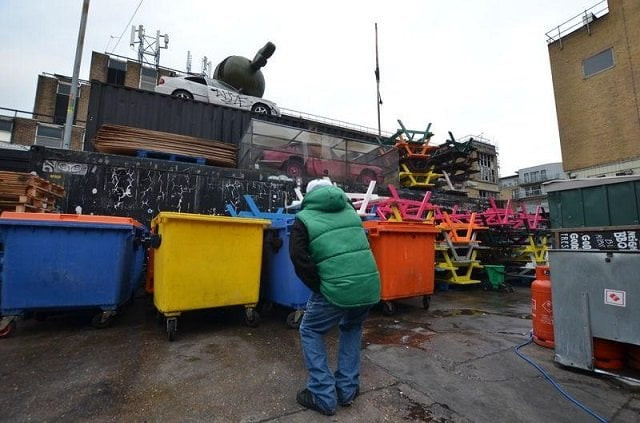From cardboard boxes to one-way bus tickets: How cities are tackling homelessness
In London alone, there are almost 1,000 people who sleep rough

Pete, a homeless man working as a tourist guide for social enterprise Unseen Tours, points at a street-art installation near Brick Lane, London, Britain on November 11, 2017.
PHOTO: REUTERS
In London alone, there are almost 1,000 people who sleep rough, according to official figures, while more than 4,000 are on the streets across Britain every night.
Here are some facts about what global cities are doing to help homeless people - or to get rid of them: Cardboard tents in Brussels Canvas tents are banned on the streets of Brussels, as camping is forbidden in the city.
An inspiring story of what a London mosque did for the homeless on Christmas
But using cardboard donated by a local factory, activist Van der Stappen worked with designers to produce 20 portable cardboard tents, which homeless people are using on the streets of the Belgian capital during the cold winter.
One-way bus tickets out of town in Seattle American cities including Seattle are giving the homeless a one-way bus ticket out of town that gives them a chance to relocate to cities with a cheaper rent and low cost of living.
It is an affordable way to reunite the homeless with their families, officials say. Replacing shelters with housing units in Finland The Finnish government has cut homelessness by 35 percent between 2008 and 2015 by giving accommodation under the country's 'Housing First' strategy.
Under this strategy shelters have been replaced by housing units based on supported rental housing. Charities letting property in London Resonance Limited, an investment company that works with social enterprises, developed the Real Lettings Property Fund in collaboration with homelessness charity St Mungo's.
Here's what happens when a Muslim pretends to be homeless
The Fund has purchased and refurbished over 250 properties in the Greater London area and leased them to St Mungo's Real Lettings team, which lets them to potential homeless people. It should help to lift over 1,000 people out of potential homelessness, according to Resonance's website.
Using an armoury as a home in Toronto The Canadian city of Toronto is revisiting a shelved proposal to use a federal armoury, Moss Park, to cope with unprecedented demand on its homeless shelter system, the city's mayor said in a recent tweet.
It will be a 24 hour respite centre with 100 beds by April 2018. Banning soup kitchens in Kuala Lumpur In 2014, authorities in the Malaysian capital Kuala Lumpur announced soup kitchens that provide food to the homeless within 2 mile radius of Kuala Lumpur city centre would be fined.
But despite the ban, initiatives such as Street Feeders continue to grow in the city through social media, feeding up to 300 homeless people fortnightly.



















COMMENTS
Comments are moderated and generally will be posted if they are on-topic and not abusive.
For more information, please see our Comments FAQ